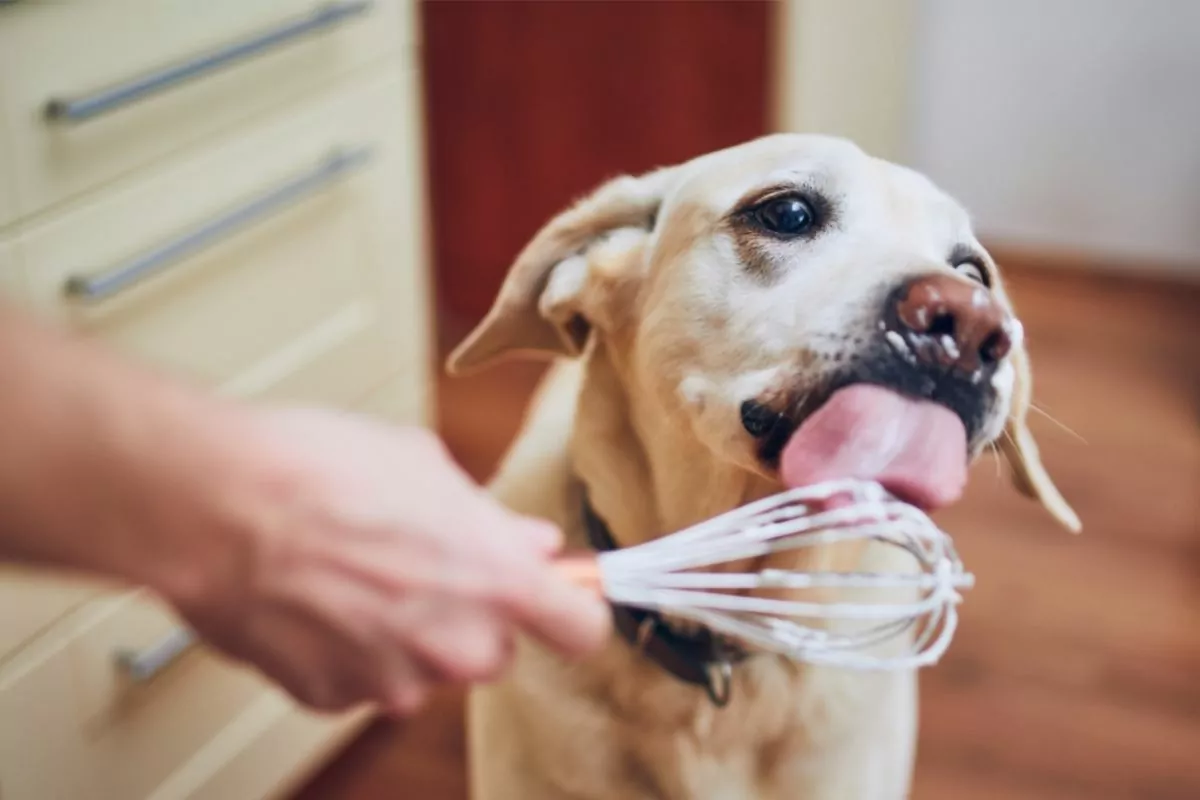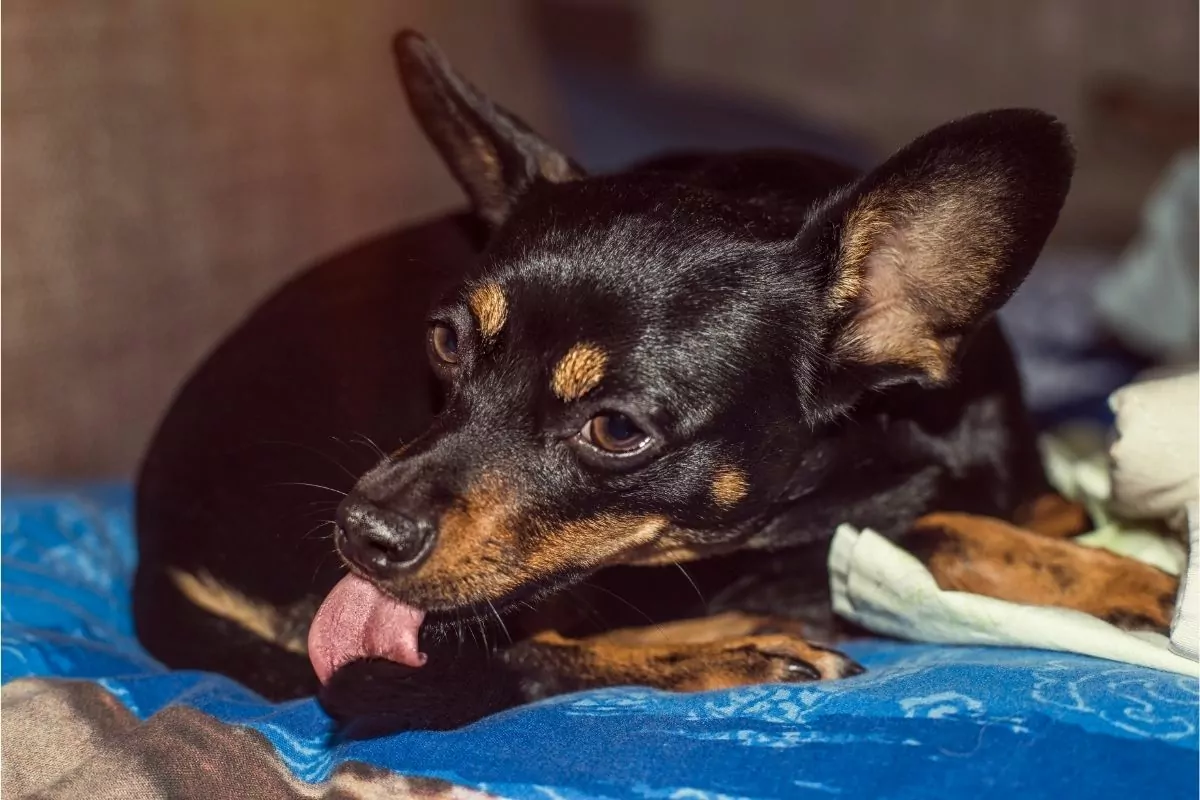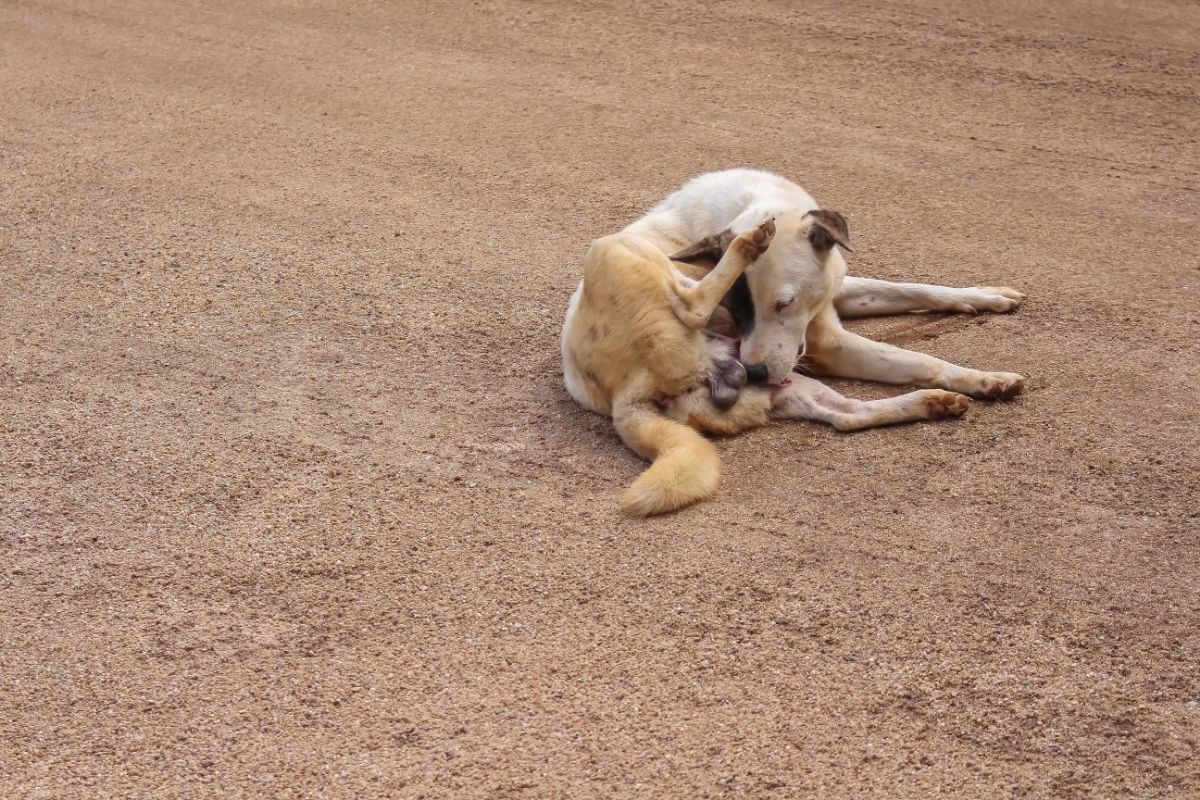Dogs and Licking
If you are thinking, why does my dog lick everything? Then you’ve come to the right place. While a small amount of dog licking is normal, excessive licking can be a sign of something going wrong for your pet.
A dog’s sense of taste is less poorly refined than ours, which might be why they like the taste of rubbish so much!
This article will dive deep into this sloppy behavior and answer all your dog licking questions.

Why Do Dogs Lick? 14 Reasons Explored
Here are fourteen common reasons why do dogs lick:
- They are itchy: Dogs can scratch and lick it to relieve the itch when skin is irritated. Flea bites and allergies are common reasons a dog might be licking and can best be investigated by your veterinarian. Regular flea treatment and limiting exposure to allergens may help relieve itching in your dog. Your veterinarian may prescribe medication to help ease the itch if it doesn’t.
- They are in pain: When there is a painful spot on your dog’s body, you may notice them licking it. But why do dogs lick themselves when they are in pain? This seems to relieve the pain slightly but is not a substitute for medical attention and can lead to skin infections. Arthritis, allergies, and skin disease can cause pain and therefore licking. Taking your dog to be examined by a veterinarian will allow the source of the pain to be addressed.
- They are dirty: Dogs prefer to be clean, and if they are dirty, they may lick themselves to give themselves a quick bath. Dogs are not as fastidious as cats and require regular grooming to keep their skin and coat healthy. If you notice your dog cleaning themselves obsessively, this could also be a sign of anxiety and should be investigated and treated.
- They are hungry: If you notice your dog lick their lips or their food bowl, they may be telling you they are hungry and ready for dinner!
- They are thirsty: A thirsty dog may develop a dry mouth which can be relieved by licking to stimulate its saliva glands. However, this is not a substitute for water so make sure to have plenty of fresh water within easy access of your pooch.
- They have a problem in their mouth: Dental disease, infections, masses, something stuck in the mouth, or injuries can cause dogs to lick due to the pain or uncomfortable feeling they are experiencing. Dogs with mouth problems may also drool or paw at their mouths. If you think your dog has a mouth problem, then a visit to the vet is to see what can be done to relieve their discomfort.
- They feel nauseated: An upset stomach caused by sickness or something your dog has eaten can cause nausea which can become apparent to the owner when you notice them drooling or licking their lips. Increased saliva causes these signs and often precedes vomiting. Other symptoms of nausea include gagging, vomiting, or a reduced appetite. If you think your dog is feeling nauseated, they need to be examined by a veterinarian.
- They are experiencing cognitive issues: As dogs age, their brain function can reduce, leading to cognitive issues. Senior dogs may experience unusual behavior such as pacing around the house, confusion, anxiety, and aggression. Senior dogs may also begin to lick excessively. If you think your dog’s cognitive function is worsening, it is best to book a vet appointment. Some medicines can help with brain function and the anxiety that comes with brain decline. Your veterinarian can prescribe this if it is suitable for your pet.
- They are stressed or bored: When dogs are bored or stressed, they could develop repetitive behaviors, similar to OCD (obsessive-compulsive disorder) in humans. These behaviors can be an attempt to self-soothe if the dog’s environment has changed, either through a new routine, new pets, or reduced attention and exercise. For example, excessive licking dog behavior in a bored dog can be relieved by spending more time with them or increasing their activity. Providing puzzle toys or hiring a dog walking service can make time away from your dog easier for them. Stress and anxiety can be more challenging to manage, and a trip to your veterinarian is an essential first step to see if anything can be done to help. Behaviorist training or medicine may be prescribed to support your dog through their anxiety.
- They are exploring their environment: Dogs love to lick things to discover new things about their environment. This is especially true for puppies. New textures and smells will be irresistible to puppies, so making sure their environment is safe will prevent any health problems from arising.
- They are trying to get your attention: When dogs want your attention, they may lick you. If you give them attention, they will know to lick you again! By patting your dog each time it licks, you may be unintentionally encouraging a habit you don’t like. Instead, wait for your dog to stop licking before praising them so they can begin to unlearn this sloppy habit.
- They are playing: Instead of biting, some dogs may learn to be gentle as they play. Licking is an alternative way to play, which owners may encourage more than roughhousing.
- They are bonding: Dogs will lick each other and their owners as a way of bonding. By “cleaning” you, dogs show their affection. If you notice your dog licking another dog’s ears, this could be a sign of infection and should be addressed.
- They want to: Some dogs love to lick, and it is as simple as that.

Should I Let My Dog Lick Me?
If you own a dog, chances are you’ve been on the receiving end of a few wet smooches. But what does it mean when a dog licks you? And should you let them?
Dogs will lick their owners for several reasons. It often means they are seeking attention or wanting to bond. It is usually considered very sweet, and owners may encourage it, but letting your dog lick you is not recommended.
Dogs carry diseases that can infect humans, and saliva is one way to spread disease. Infections such as giardia, salmonella, and campylobacter can transfer from dog to human and make people sick. If your dog is unwell, it is crucial to practice good hygiene, including preventing them from licking you.
Not only can dogs transfer their diseases, but they often will eat garbage, rotten food, or even dog poop which can end up in contact with your skin or mouth if you let them lick you. While these products may not make your dog sick, they could make you or someone else sick.
Letting your dog lick you on the mouth is not a good idea, and if your dog licks you elsewhere, cleaning that spot well will help prevent the spread of disease.
Practice good hygiene and make sure to wash your hands with soap and water after you touch your dog. Children are more likely to encourage excessive licking through squeals and laughs, which may encourage your dog to do it more. Not only that, but since children are smaller, they may struggle to defend themselves from an overly friendly dog’s licks.
Proper training and consistency will teach your dog that no licking is acceptable, and children and guests will thank you for the effort!
What to do When Your Dog Won’t Stop Licking
If you notice your dog constantly licking or your dog won’t stop licking, you might become frustrated.
Dog excessive licking can be challenging to manage and may be a symptom of an underlying issue. The first thing to remember is your dog needs some understanding. A dog licking excessively will not be doing it to upset you and likely needs some help to stop.
The next step in solving your dog’s licking woes is to rule out a medical problem. A visit to your veterinarian can help rule out some common issues such as flea infestation, skin disease, and pain such as arthritis.
Further investigation might be necessary once the obvious things have been ruled out. Your veterinarian may recommend blood tests or imaging. Diseases such as arthritis, hypothyroidism, or hyperadrenocorticism (Cushing’s), could lead to excessive licking and might need to be resolved for the problem to stop.
As your veterinarian rules out health issues, they may suggest that your dog’s licking could be behavioral. Frustration, anxiety, and boredom can cause excessive licking in particular dogs and will need time to fix.
A dog licking excessively for behavioral reasons may benefit from schedule changes, behaviorist training, or prescription medicine to help calm them. Your veterinarian will help you with this and advise on the best next step for your dog.
When is Dog Licking Concerning?
If you’re asking yourself why does my dog lick everything constantly, then the licking is likely a cause for concern. However, as an owner, you will likely know what is normal for your dog, and if you think your dog’s licking is a concern, it probably is.
Licking a specific area may signal disease. For example, a dog licking its elbow could have arthritis, or a female dog licking her genitals could have an infection. On the other hand, generalized licking could be a sign of behavioral issues or all-over itchiness caused by allergies or flea infestation.
Each dog is different, and the amount they lick will vary from one dog to the next. However, a sudden change to your dog’s licking is likely triggered by something and should not be ignored.
Physical health concerns and behavioral issues can trigger excessive licking, so it is not always easy to decipher what is going on.
Most dogs will only lick occasionally and not for very long. However, if you notice your dog licking often throughout the day or for extended periods, this is unusual and should be addressed. Your veterinarian will be able to help you decipher if your dog’s licking is cause for concern, and then they can help you fix it.

Lick on, Lick Off!
Licking is an everyday activity for most dogs to bond with other dogs and explore their environment. However, while a dog’s sense of smell is much more refined than ours, their taste is more poorly developed.
Most dogs will not have a problem with licking and will only do it in certain situations, but it warrants investigation when licking becomes an issue.
Skin disease, pain, hunger, thirst, and nausea are just some health issues that may lead a dog to lick. Veterinary advice can help you get to the bottom of your dog’s health concerns if they are not immediately apparent.
Boredom, frustration, and anxiety can also trigger licking and may require ruling out health issues before making a diagnosis.
Keeping your dog healthy through regular parasite treatment, feeding good quality food, and regular vet visits can help prevent health issues that lead to licking. While maintaining a good routine with regular exercise and training will keep your pup stimulated and fit, removing boredom and stress that may lead to OCD behaviors like licking.
